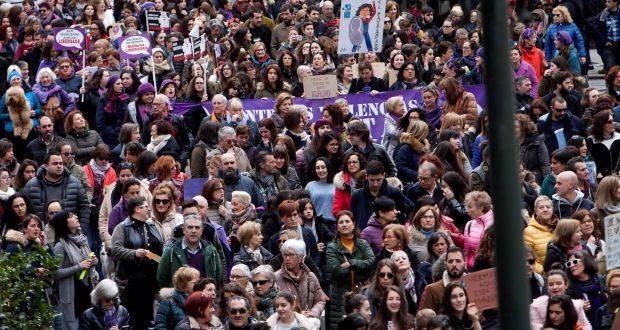Spanish women stage unprecedented strike for rights
MADRID-Agence France-Presse

Spain marked International Women’s Day on March 8 with an unprecedented strike in defense of their rights that saw hundreds of trains cancelled and countless protests scheduled throughout the day.
Called by 10 unions to demand gender equality, particularly where salaries are concerned, the strike dominated the headlines with famous female presenters noticeably absent from radio or television shows.Feminist groups have also called on women not to spend money, particularly on items such as deodorant whose versions created for women often cost more, and to ditch domestic chores for the day.
The strike is attempting to emulate Iceland’s 1975 work stoppage, when women took a day off in October to demonstrate their vital contribution to the country’s economy and society.
However Spain’s two main unions -- the CCOO and UGT -- have called on their members to stop work for only two hours on March 8.Ana Reyes, a 37-year-old PR executive, said she was striking “in the hope that the importance of half of the population will be recognized and that it will bring about a real change.”
She told AFP the action gave “visibility to the malaise and discrimination we women suffer.”The strike comes as countries around the world mobilize for #internationalwomensday2018, a worldwide trending topic on Twitter, and comes hot on the heels of #MeToo and #Timesup campaigns that went global with allegations of sexual misconduct in Hollywood.
Spain is a leading country in the fight for women’s rights and against gender violence, even though much remains to be done.In 2004, for instance, the then Socialist government approved a law on violence against women that the European Council has upheld as an example to follow.
The groundbreaking legislation set up a hotline that would not appear on users’ phone bills, offered free legal aid and established special courts for victims.Last year, though, 49 women died at the hands of their partners or ex-partners, an increase on 2016 when 44 were killed, official statistics show.
Women earn 14.9 percent less than men in Spain, slightly better than the EU average of 16.2 percent, according to the bloc’s statistics agency Eurostat.Official data also show that more women leave their job when they have children than men.
It was not yet clear how many Spaniards went on strike, but trains on the Madrid and Barcelona undergrounds were less frequent than usual.
Meanwhile, more than 300 intercity and long-distance trains were cancelled throughout Spain.The mobilization started at midnight when women gathered on Madrid’s central Puerta del Sol square to bang pots and pans.
















